Stress-management (self-study material)
Read: Stress and the brain
Stress and the brain

Stress and the brain
Prolonged stress without time for recovery is harmful for our brains and our ability to process information. The first area it affects is the working memory. The working memory areas of the brain receive, processes and for a brief period store information. It governs how much information we are able to keep in mind in a given moment, or all the information thought necessary for performing a task. As the working memory conveys information to our long-term memory, it is crucial for learning. The capacity of the working memory is limited, comprising 3 to 5 units of information according to the latest research.
Stress easily causes the working memory to overload, which manifests as forgetfulness and difficulties concentrating as, during stress, fewer units of information than usual can be kept in the mind simultaneously. Brain functioning is less nimble than usual in terms of creativity, memorisation, and managing larger aggregates of information. Other disturbances may also occur when stressed. This can be seen in studies in, for example, an increase of functional errors, such as sending an email without a needed attachment. Maintaining concentration is also challenging: one’s attention may easily tend to wander when studying for an exam.
Studying under stress may turn into fumbling and bumbling. Many things may be start, but nothing is carried through completely. Our brains are at their best when we concentrate on one thing at a time and not even try to multitask. Multitasking is particularly burdensome for the brain. It demands a lot of energy to constantly switch one’s attention to new things. Multitasking frequently leads to inefficient work and hinders getting into the periods of longer concentration that are the best enablers of learning.
We can make our brains more agile by taking breaks regularly while studying. This allows the mind to rest at regular intervals to recover. It pays to consider, however, what kind of breaks you take. A short walk around campus may be more restorative than sitting down with a cup of coffee and going through social media. It is also important to prevent various kinds of distractions and interruptions. Interruptions are toxic for the brain in that getting back to the previous state of concentration can take a surprisingly long time. For this reason, you should find a study place that is peaceful and minimise the number of possible distractions. Notifications sounds and vibrations from electronic devices should be turned off.
Long-term stress may lead to burnout, which may have even broader impacts on one’s ability to process information. Research into how people with even in the very early stages of burnout perform cognitive tasks compared to control subjects shows that burnout activates different areas of the brain. This may signify that the brain when near exhaustion has to exert itself more than usual and therefore make use of other areas. When burnout has progressed further, studies show that the ability to process information slows down, one has problems remembering things, the working memory becomes constricted and problems arise with concentration. For example, individuals in a state of burnout have been found to have more difficulty switching between tasks than other people. The attention of people with burnout shifted to negative sounds and away from positive ones, suggesting that burnout may cause one to become more receptive to noticing things that are disagreeable and unpleasant.
You should therefore watch after your own energy reserves and ability to cope, and pay attention to how you tend to perform work, for in this way you are also taking care of your ability to process information, your thoughts, emotions, body and brain!
References:
Keskittymiskyvyn elvytysopas, Huotilainen M. & Moisala M., 2018.
Burn out in the brain at work, Sokka L., 2017.
Työstä ja tarkkaavaisuudesta, Kuikka P. & Paajanen T., 2015.